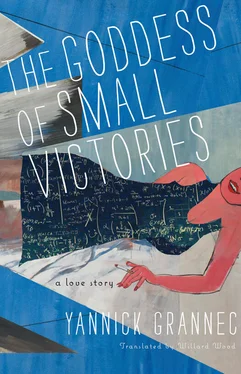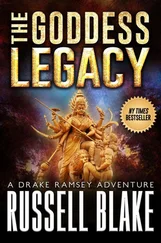“Why not choose the future? Why lose yourself in the past and its impossibilities?”
Oskar glanced at my husband out of the corner of his eye before answering Lili. He didn’t want to upset his friend and spend days paying for his frankness.
“Death also contradicts the idea of time travel.”
“The fear of death is totally unjustified, dear Oskar. There is not the slightest risk of an accident once you are dead.”
I smiled. Albert was rehashing one of his favorite aphorisms, but he went on to develop a more substantial response.
“Death is just a final consequence of entropy. A broken cup won’t glue itself back together. We go from point a in childhood to point b in old age. The idea of before and after has an irrefutable physical existence on the scale of our human lives. That this evidence might lose its irreducibility through mathematical concepts pushed to their limits, I can conceive … But maybe we should exclude them. Just because they contradict our physical experience.”
“Yet you once said if the facts don’t agree with the theory, then change the facts.”
“Your memory is too good, Gödel. And I talk too much. Allow an old man to be occasionally wrong. Nothing can fight entropy. It is my most intimate enemy. It puts the ground a little lower every morning.”
“Opposing an objective demonstration with an experiential argument hardly strikes me as very rational, Herr Einstein. You surprise me.”
“Oskar, I find reason tiresome. My intuition has been my guiding light for years, and it has never steered me wrong. The intuitive faculty is a sacred gift. The rational faculty is a faithful servant. We have created a society that honors the servant and has forgotten the gift.”
“It worships the appearance of rationality,” said Morgenstern. “Its livery.”
“We agree on that point. Scientific research is a subtle balance between intuition and reason.”
“An equilibrium not to be forgotten along the way, Herr Einstein. We live in the age of calculators. Intuition plays no part in their functioning.”
“One day, machines will be able to solve every problem, but never will a machine be able to pose one!”
I thought of our friend von Neumann. Using the ENIAC, he had just calculated π to the 2,037th decimal. The Oppenheimers’ babysitter had given us a detailed account of it, ignoring little Toni, who was tugging at her skirt. The first “electronic” computer, in operation since 1946, was a thirty-ton toy that took up the space of a good-sized apartment. Its thousands of resistors, condensers, and other diodes allowed it to compute five thousand operations per second. Though skeptical of the usefulness of this gigantic abacus, I’d been touched by the young student’s enthusiasm. Maybe this new world would give greater scope to women. In the meantime, entropy hadn’t spared the logical monster that sprang, in part, from von Neumann’s cannibalistic brain. His engineers spent more time replacing parts than calculating: insects were constantly drawn to the vacuum tubes, where they fried in the heat. 31It always reassured me to see these big brains brought back to reality.
Albert rescued us from becoming too serious by rising from the table, giving the general signal for departure.
“My friends, I am going home before I self-destruct in front of your appalled faces. Adele, thank you for the charming lunch. I am leaving you with all these dirty dishes. Only women still have the courage to fight entropy.”

Kurt and I accompanied our friends to the door, after which he eclipsed himself. I brought the house back to a semblance of order, relishing the silence. Before meeting Kurt, I had never asked myself metaphysical questions. There was God, there were men, and there was the daily quest to put food on my plate. All these discussions allowed me a glimpse of the vast expanse of questions I had never asked myself. But in the end, was it the nature of the world to be complex, or was it man’s questioning that made it so? Kurt had no simple answer for me. By choosing to follow him, I had had to abandon the comfort of ignorance. I was willing enough, but I lacked the capacity for metaphysics. I realized very late that the temptation to metaphysics is not overly concerned with religion or nationality, with types or cultures. It is freely available to all, but the luxury of enjoying it is given only to a few.
What did their philosophical acrobatics matter in the context of daily life? If they had any capacity to listen, I would have told them, I would have given them my opinion. I knew the order of time: in the linking of stitches to make a hem, in dishes washed and put away, in precise rows of ironed linen, in a perfectly browned pie that fills the house with its scent. When you have your hands in flour, nothing can happen to you. I liked the smell of yeast, its hint of a fertile order. I believed in this order of life, for want of giving it a meaning.
My husband queried the stars, whereas I already had a well-ordered universe. A tiny one, to be sure, but protected, and on this earth. They left me alone to battle entropy. Thanks a bunch! If men swept the floor once in a while, they’d be a lot less unhappy.
Anna hesitated before entering Mrs. Gödel’s bedroom. Adele was in lively conversation with Gladys, whose pink angora sweater and spangled vinyl bag seemed in no hurry to leave. Raising her arms to rearrange her beehive, she exposed two repulsive yellowish stains. Anna looked away.
“We were waiting for you. The shower is all clean, we have washed it especially for you.”
Adele pointed toward her tiny bathroom. Not quite sure what was happening, Anna took the towel and the lemon that were handed to her.
“Wash your hair! Gladys is going to give you a little haircut.”
The young woman stared in terror at Gladys’s surrealist puffball.
“Don’t worry,” said Gladys. “I ran a hair salon for more than thirty years.”
With a melodramatic gesture, Adele clasped her hands to her breast.
“Don’t try to argue with us or I’ll have the vapors.”
Anna complied with a deep sigh. Kneeling in front of the plastic basin, she wondered at her passivity. To what lengths will you go for those damned archives? The question as she had formulated it sounded false. She had no time to think it through: Gladys appeared in the bathroom.
“The lemon is to rinse with. I would have washed your hair myself, but you know how it is with my bad hip …”
Anna raised her head and the foam burned her eyes.
When she returned to the bedroom, the hairdresser was waiting for her behind the only chair, scissors and comb at the ready. Anna sat down with visible anxiety.
“What will it be next time? A course in putting on makeup? Do you take me for a toy?”
She cried out. Her torturer was yanking the comb through her hair, while Adele looked on with a big smile of satisfaction.
“You’re one of those dolls that cry when you tug on their hair.”
Anna had always hated those plastic simulacra. She preferred playing with Leo’s Erector set, even if he showed greater talent at it. Still, every Christmas brought its cargo of disappointing dolls, which she undressed, daubed with paint, and tossed in the garbage without a second thought. Rachel had dragged her off to see a psychologist, afraid that her daughter was uncomfortable with her femininity. The therapist had smiled and advised the mother to encourage her daughter’s artistic leanings.
“Your hair is like a pile of straw! I should have gotten some vegetable oil from the kitchen.”
“Let’s make one thing clear! You’re just trimming the ends!”
Читать дальше













